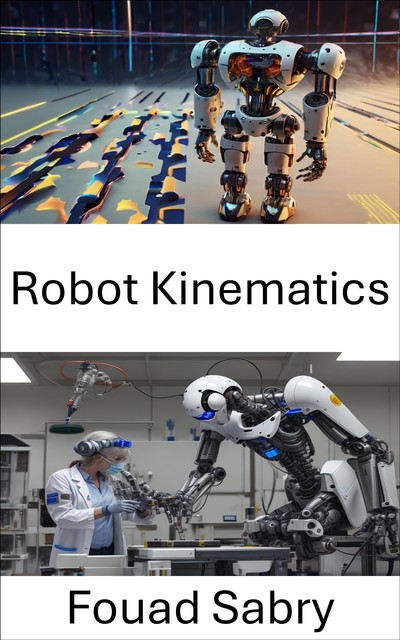We use cookies to improve the Bookmate website experience and our recommendations.
To learn more, please read our Cookie Policy.
To learn more, please read our Cookie Policy.
Accept All Cookies
Cookie Settings
Something went wrong. Try again.
“Robot Kinematics” is an essential guide to the complex yet fascinating world of robot movement and control. This book, part of the “Robotics Science” series, is designed for professionals, students, enthusiasts, and hobbyists interested in understanding the intricacies of robot kinematics. Whether you're a graduate student looking to deepen your knowledge or a professional aiming to enhance your skills, this book will provide both foundational principles and cuttingedge applications in robotics.
Chapters Brief Overview:
1: Robot kinematics: Introduces the basic principles of robot motion and the mathematical framework behind it.
2: Industrial robot: Discusses the various types of industrial robots and their kinematic systems for production.
3: Configuration space (physics): Explores the concept of configuration space and its role in solving robot motion problems.
4: Inverse kinematics: Focuses on methods to determine joint parameters that achieve a desired endeffector position.
5: Arm solution: Examines solutions for robot arm configurations, from basic to advanced manipulations.
6: Screw theory: Introduces screw theory, a mathematical method for describing rigid body motion and robot kinematics.
7: Linkage (mechanical): Looks at the role of mechanical linkages in robot design and their impact on movement.
8: Trajectory optimization: Explores methods to optimize robot trajectories for efficient and accurate movement.
9: Inverse dynamics: Covers how to calculate the forces and torques required to produce desired motion in a robot.
10: Mechanical singularity: Discusses singularities in robotic systems and how they affect motion and stability.
11: Serial manipulator: Focuses on serial robot manipulators, their structure, and motion analysis.
12: Parallel manipulator: Analyzes parallel robot manipulators and their advantages over serial ones in certain applications.
13: Forward kinematics: Examines the method for determining the position and orientation of a robot’s end effector.
14: Kinematic chain: Introduces the concept of kinematic chains and their applications in robot movement.
15: 321 kinematic structure: Focuses on the 321 kinematic structure, a common configuration in robotics.
16: Denavit–Hartenberg parameters: Discusses this standard convention for describing robot arm configurations.
17: OpenRAVE: Explains how OpenRAVE, an opensource software, is used for robot motion planning and simulation.
18: Manipulability ellipsoid: Introduces the concept of manipulability ellipsoids and their use in evaluating robot performance.
19: Kinematics equations: Provides a deep dive into the kinematic equations that govern robotic movement and manipulation.
20: Product of exponentials formula: Focuses on this mathematical tool for modeling robot motion in a more efficient manner.
21: Fivebar linkage: Analyzes the fivebar linkage mechanism and its application in robotic systems for precise motion.
This book is an invaluable resource that delves deep into the theoretical and practical aspects of robot kinematics, preparing readers to approach complex robotics challenges with confidence. By understanding the content covered in this book, professionals and students alike will be equipped to design, analyze, and optimize robotic systems in various industries. Don’t miss out on the opportunity to enhance your understanding of robotic systems, and gain the knowledge needed to stay at the forefront of the evolving robotics field.
Chapters Brief Overview:
1: Robot kinematics: Introduces the basic principles of robot motion and the mathematical framework behind it.
2: Industrial robot: Discusses the various types of industrial robots and their kinematic systems for production.
3: Configuration space (physics): Explores the concept of configuration space and its role in solving robot motion problems.
4: Inverse kinematics: Focuses on methods to determine joint parameters that achieve a desired endeffector position.
5: Arm solution: Examines solutions for robot arm configurations, from basic to advanced manipulations.
6: Screw theory: Introduces screw theory, a mathematical method for describing rigid body motion and robot kinematics.
7: Linkage (mechanical): Looks at the role of mechanical linkages in robot design and their impact on movement.
8: Trajectory optimization: Explores methods to optimize robot trajectories for efficient and accurate movement.
9: Inverse dynamics: Covers how to calculate the forces and torques required to produce desired motion in a robot.
10: Mechanical singularity: Discusses singularities in robotic systems and how they affect motion and stability.
11: Serial manipulator: Focuses on serial robot manipulators, their structure, and motion analysis.
12: Parallel manipulator: Analyzes parallel robot manipulators and their advantages over serial ones in certain applications.
13: Forward kinematics: Examines the method for determining the position and orientation of a robot’s end effector.
14: Kinematic chain: Introduces the concept of kinematic chains and their applications in robot movement.
15: 321 kinematic structure: Focuses on the 321 kinematic structure, a common configuration in robotics.
16: Denavit–Hartenberg parameters: Discusses this standard convention for describing robot arm configurations.
17: OpenRAVE: Explains how OpenRAVE, an opensource software, is used for robot motion planning and simulation.
18: Manipulability ellipsoid: Introduces the concept of manipulability ellipsoids and their use in evaluating robot performance.
19: Kinematics equations: Provides a deep dive into the kinematic equations that govern robotic movement and manipulation.
20: Product of exponentials formula: Focuses on this mathematical tool for modeling robot motion in a more efficient manner.
21: Fivebar linkage: Analyzes the fivebar linkage mechanism and its application in robotic systems for precise motion.
This book is an invaluable resource that delves deep into the theoretical and practical aspects of robot kinematics, preparing readers to approach complex robotics challenges with confidence. By understanding the content covered in this book, professionals and students alike will be equipped to design, analyze, and optimize robotic systems in various industries. Don’t miss out on the opportunity to enhance your understanding of robotic systems, and gain the knowledge needed to stay at the forefront of the evolving robotics field.
more
164 printed pages
- Original publication
- 2024
- Publication year
- 2024
- Publisher
- One Billion Knowledgeable
Have you already read it? How did you like it?
👍👎
fb2epub
Drag & drop your files
(not more than 5 at once)


